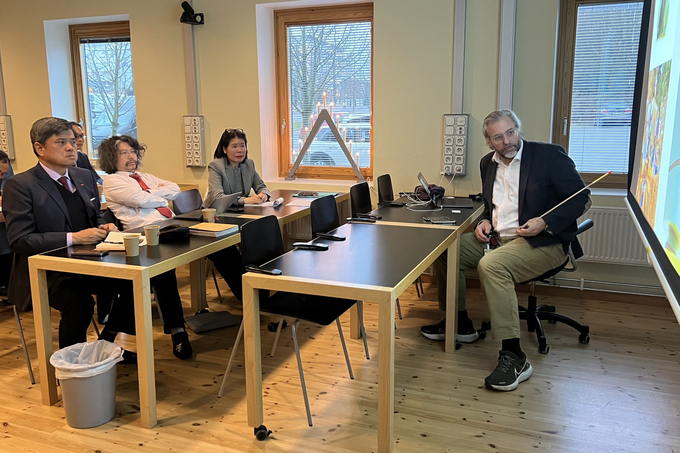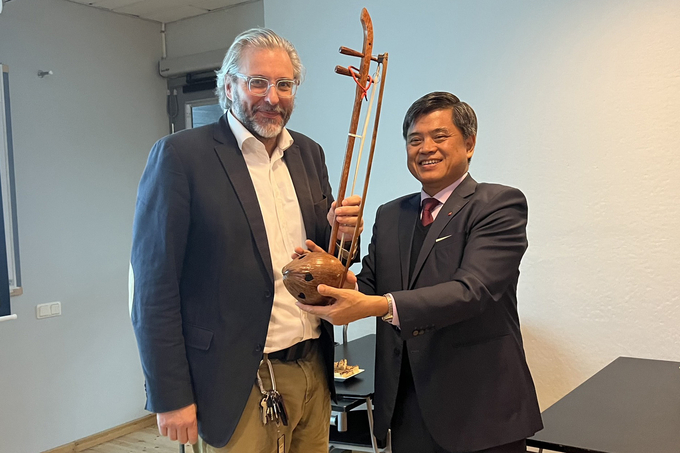May 21, 2025 | 06:16 GMT +7
May 21, 2025 | 06:16 GMT +7
Hotline: 0913.378.918
May 21, 2025 | 06:16 GMT +7
Hotline: 0913.378.918

Deputy Minister Tran Thanh Nam had a meeting with the Lund University's School of Design. Photo: Thanh Huyen.
At the meeting with the Lund University's School of Design, Deputy Minister Tran Thanh Nam proposed the University to coordinate training in designing and developing craft products and packaging for OCOP products. He also requested Lund University's School of Design to design training programs for Vietnamese OCOP businesses and craft villages with the focus on designing attractive products that are suitable to market tastes as well as help preserve the regional tradition in each product.
Deputy Minister Tran Thanh Nam also emphasized that promoting the development and conservation of craft village products is one of Vietnam's priorities to secure jobs and improve local people's livelihoods. Subsequently, it will help keep local people from abandoning craft villages, contributing to the construction of new rural areas.
Craft village products and OCOP products are also developed according to the criteria of the circular economy model and the green economy with the aim of reducing emissions.
Receiving the Vietnamese delegation was the Principal of the Lund University's School of Design, Mr. Claus-Christian Eckhardt. The Principal introduced that Lund University, established in 1668 with over 350 years of age, is a prestigious University on the top 100 list of best Universities in the world.
Lund University's School of Designwas founded in 1995 by the President of the IKEA Group. The University's Undergraduate and Postgraduate Programmes also undertakes many projects with international organizations.
Lund University has cooperated with Vietcraft Company in the past to implement a design development project for the craft industry funded by SIDA and the European Union; the result was the establishment of the Hanoi Design Center. The University has acknowledged the delegation's suggestions and will cooperate in training product design for Vietnamese OCOP businesses and craft villages. Vietnam will coordinate with Sweden to find sources of support once this activity is implemented.
After the meeting, the Vietnamese delegation were guided by representatives of the University to visit the economic model of craft villages in association with sustainable tourism, and the manual glass production facility. Consequently, Vietnam can draw experience from the focus on conservation and development of craft villages in Sweden, including criteria that need to be associated with green and sustainable development.

Deputy Minister Tran Thanh Nam gifting Principal Claus-Christian Eckhardt a musical instrument made from fruit and coconut wood.
Based on the prposed ideas of cooperation with Lund University's School of Design, the delegation had a working session with the IKEA Foundation based in Malmo. At the meeting, Deputy Minister Tran Thanh Nam emphasized the development orientation of Vietnam's agricultural sector and craft villages with regards to sustainable development according to the value chain approach, from developing a material area with FSC-certified sustainable forest management, traceable ingredients to adopting clean production, reducing emissions, and developing sustainable designs in compliance with international standards to utilize agricultural waste and create products which will promote fair trade.
The Deputy Minister suggested the IKEA Foundation to research cooperation and support the following contents:
Firstly, it is proposed that IKEA support the program to develop sustainable designs by Lund University's School of Design in collaboration with vocational schools under the Ministry of Agriculture and Rural Development of Vietnam to support training for the development of Vietnamese crafts villages.
Secondly, establish a cooperation program to develop a sustainable value chain focusing on bamboo and rattan. The technical and financial support from the IKEA Foundation will help Vietnam develop a FSC-certified sustainable forest management material area, raw materials with high tracibility; adopt clean production processes; develop sustainable designs; comply with international standards, focusing on IKEA's IWAY;
IKEA is proposed to coordinate and support Vietnam in developing several models of utilizing agricultural waste to develop new value-added products, namely utilizing pandan leaves, banana peels, cashew nut shells, coffee husks, rice straw and so on to reduce emissions.
Thirdly, coordinate and support Vietnam in the development of social businesses, businesses operating with the impoverished, with emphasis on people who live in the buffer zone of natural forests to reduce the pressure of this community on the forest and conserve biodiversity.
Finally, coordinate and support the Ministry in developing the value chain of products from flax, a plant that absorbs greenhouse gases for consumption in the IKEA's system.
Recommendations by the Vietnamese delegation were in line with the criteria under the IWAY code of conduct, issued by IKEA since 2000 which outlines IKEA's minimum requirements for Environment, Social Responsibility and Working conditions.
The IKEA Foundation side acknowledged the suggestions from the delegation and requested the Ministry of Agriculture and Rural Development to promptly deliver detailed proposals for the two countries to discuss a possible agreement on projects and specific activities in the near future.
During his visit to Sweden, Deputy Minister Tran Thanh Nam also informed the partners regarding the plan to organize the International Festival of Handicrafts in Hanoi in 2023.
After concluding the visit to Sweden, the delegation continued working in Italy from December 3 to December 6.
IKEA is a corporation that places heavy emphasis on sustainable value chain development. They are currently interested in the value chain of bamboo, rattan, wood, etc. IKEA is also very interested in social businesses, especially businesses owned by women and those that work with disadvantaged communities.
Translated by Nguyen Hai Long

(VAN) In 2024, over 295 million people across 53 countries and territories faced acute hunger—an increase of almost 14 million people compared to 2023, while the number of people facing catastrophic levels of hunger reached a record high.

(VAN) World Environment Day 2025 (June 5) carries the theme 'Beat Plastic Pollution' continuing to emphasize the global urgency of addressing the plastic waste crisis.

(VAN) This was the assessment shared by experts at the workshop titled 'Assessing the Role and Potential of Low-Emission Rice Production Systems in Vietnam,' held on the morning of May 19.

(VAN) Cai Rong Port is the fisheries control center of Quang Ninh, helping to monitor fishing vessels, combat IUU fishing, and remove the EC's 'yellow card'.

(VAN) The German Agricultural Society (DLG) explores the possibility of establishing a mechanization service center in Vietnam’s Mekong Delta to support farmers in accessing and utilizing advanced machinery.

(VAN) On May 16, the Department of Water Resources Management, in collaboration with the Food and Agriculture Organization of the United Nations (FAO), held a signing ceremony for the GEF-8 project document.

(VAN) Food safety, mechanization, vocational training, and market opening are key areas of cooperation expected between the Vietnamese Government and the Federal Republic of Germany.